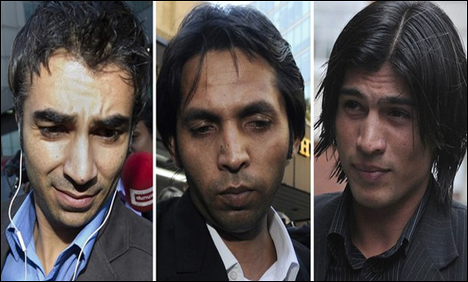 Pakistan and the world of cricket will never be the same after three international players were hauled over the hot coals and deservedly booted into a cell to be held at Her Majesty’s Pleasure. Salman Butt (30 months), Mohammad Asif (one year) and Mohammad Amir (six months) were sentenced earlier this week as the courts and cricket authorities attempt to eradicate fixing from the sport. It has given the wider world the feeling that justice has indeed been dished out. More worrying is that the biggest cricket playing nations in the world still have yet to do something that would go some way to preventing this from occurring on more occasions.
Pakistan and the world of cricket will never be the same after three international players were hauled over the hot coals and deservedly booted into a cell to be held at Her Majesty’s Pleasure. Salman Butt (30 months), Mohammad Asif (one year) and Mohammad Amir (six months) were sentenced earlier this week as the courts and cricket authorities attempt to eradicate fixing from the sport. It has given the wider world the feeling that justice has indeed been dished out. More worrying is that the biggest cricket playing nations in the world still have yet to do something that would go some way to preventing this from occurring on more occasions.
Many media outlets have decided to tread the route of sharpening the knives at the gambling industry’s back. At the same time, there’s something they’ve failed to recognize. India and Pakistan, the two largest cricketing nations on the planet, look upon sports betting as an illegal practice. That means there’s no regulation and anyone wanting to bet has to do so through unlicensed and unregulated people.
All you need do is look at the figures being bet on cricket in India. The glitz and glamour of the Indian Premier League gives off the aura of Bollywood mixing with the world of sport. Unlicensed sports’ betting is perhaps the biggest winner of them all here. The last tournament saw an estimated £1billion (74billion rupees) bet on 57 matches. All of that was of course done with unlicensed and unregulated operators. It’s something that means matches will always be open to the fixing we’ve seen with the three accused.
The market not being regulated means that there is no system in place to ensure that betting irregularities are monitored. The latest case to come to the fore in the UK is that of Motherwell player Steve Jennings. The story goes that he was persuaded to get himself sent off while all his mates made a fortune. Warning systems picked up on the unusual amounts being staked on this event and an investigation began with arrests made. In India and Pakistan there’s nothing to recognize these abnormalities.
Until either the ICC match-fixing unit is enlarged or something is done to regulate sports betting, it’s likely this will happen again. Hefty prison sentences totaling four years for the three players involved will have done a lot to eradicate the practice. It won’t stop the unlicensed bookmakers that operate in these to subcontinent nations and cricket is always going to be the sport they prey upon.
